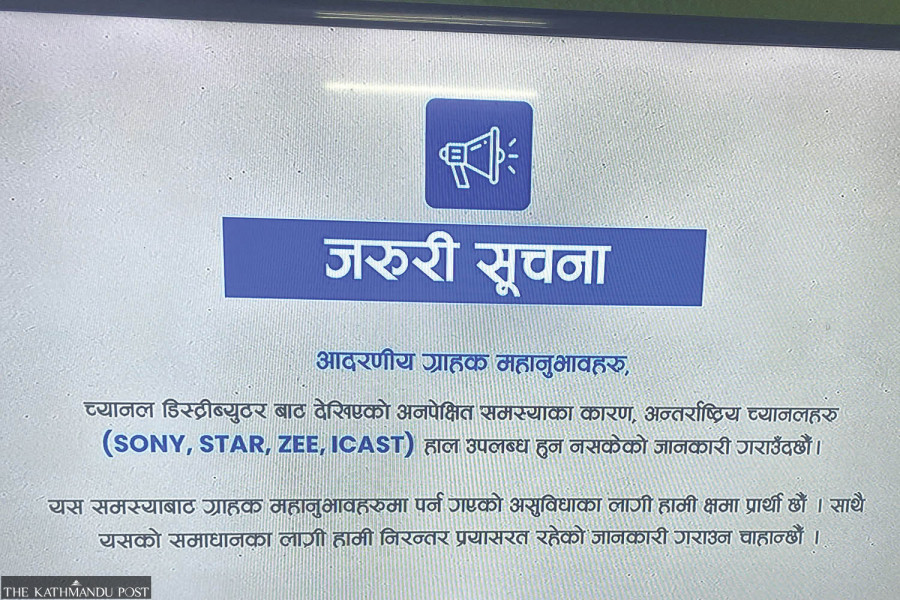Money
‘Dear customers, some channels are unavailable’
Since Thursday, Nepali TV operators have suspended channels like Sony, Star, and Zee due to payment issues caused by delays in foreign exchange approval.
Post Report
For the past five days, every TV screen in Nepal has been displaying a message: Dear customers, due to a sudden and unforeseen problem with the channel distributor, international channels like Sony, Star, Zee, and Icast are currently unavailable.”
Cable and internet TV operators have apologised for the disruption and assured that they would resolve the matter.
Consumer rights activists say that consumers are being cheated under various pretexts.
Nepali operators say that delays in approving the à la carte pricing guidelines by the Finance Ministry led the Indian broadcaster to cut some channels from cable and internet TV services last Thursday evening.
“As the dues piled up due to the delays by the government in giving approval to the pricing guidelines, the Indian Broadcasting and Digital Foundation decided to cut channel services in Nepal,” said Sudhir Parajuli, president of the Federation of Nepal Cable Television Association.
The Indian Broadcasting and Digital Foundation is a unified representative body of TV broadcasters and over-the-top platforms in India. Over-the-top platforms are streaming services like Netflix and Amazon Prime Video, among others, that deliver content over the internet directly to viewers.
Before the à la carte system, broadcasters and distributors would reach an agreement and sign a contract that included pricing details, said Parajuli. “With the implementation of the à la carte system, new pricing guidelines were required.”
In August last year, the Ministry of Communication and Information Technology formally implemented the “pick-and-pay” option for Nepali television viewers.
“Since the Indian broadcasters were initially not ready to adopt the à la carte system, we were also in a dilemma. Eventually, the government strictly enforced the system.”
The Ministry of Communications then prepared and sent the tariff guidelines to the Ministry of Finance.
“It took a while for the Ministry of Finance to give its approval,” said Parajuli.
The Ministry of Finance finally gave its approval to the guidelines last Thursday and sent them to the Ministry of Communications, said Parajuli.
“The distributors have not been able to pay the Indian broadcasters for the last 14 months. The outstanding dues amount to Rs500 million,” Parajuli said.
The Ministry of Communications could not issue foreign exchange recommendations for distributors to pay their Indian vendors because the guidelines had been stalled.
“Now that the guidelines have been approved, services will resume within a few days,” Parajuli said.
Government officials claimed they were unaware of the issue.
The secretary at the Ministry of Communications, Radhika Aryal, said she was unaware of the issue because she had been newly appointed to the ministry.
The Post's multiple attempts to reach the ministry spokesperson Gajendra Thakur were unsuccessful.
Officials from the Department of Information and Broadcasting, also said they were unaware of the issue.
The à la carte system allows viewers to choose and pay only for the channels they want to watch.
This allows viewers to watch their favourite channels and pay only for those, rather than the whole package that includes channels they rarely watch. The Ministry of Communications has fixed a minimum monthly fee of Rs250 per customer for cable television to cover carrying costs.
This model is used in countries like India, the United States, and Canada.
According to the federation, there are eight cable TV operators, including internet TV providers in Nepal. Around 110 Nepali channels and 98 foreign channels are broadcast in Nepal, serving around 1.5 million subscribers who have renewed their subscriptions.
Service providers pay monthly fees to both the distributor and to the Indian broadcasters. “We have been paying the distributor every month, but the distributor has not received foreign exchange approvals from the Ministry of Communications,” said Parajuli.
According to the federation, the Indian broadcaster has suspended all packages from Zee, Sony, Colours, and Star across the country. If some customers still have access to these channels, then it must be pirated.
Currently, TV channels in Nepal are broadcast through direct-to-home, multiple-system operators, multichannel multipoint distribution services, internet protocol television, and digital terrestrial television, among other methods.
“Customers pay in advance for cable TV services, but the service has been interrupted for five days, and there is no sign of resumption. This is a total scam,” said Prem Lal Maharjan, president of the National Consumers Forum.
“Who is responsible for this, and who will compensate for this?”
He demanded that the service providers compensate the customers for the disruption.




 16.44°C Kathmandu
16.44°C Kathmandu












